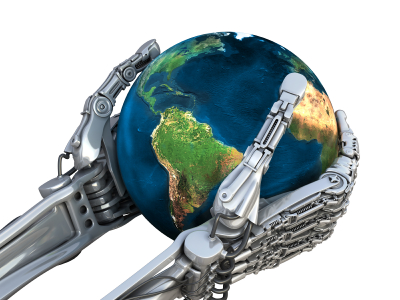A magazine where the digital world meets the real world.
On the web
- Home
- Browse by date
- Browse by topic
- Enter the maze
- Follow our blog
- Follow us on Twitter
- Resources for teachers
- Subscribe
In print
What is cs4fn?
- About us
- Contact us
- Partners
- Privacy and cookies
- Copyright and contributions
- Links to other fun sites
- Complete our questionnaire, give us feedback
Search:
The Singularity

What happens when computers get clever enough to start designing themselves? Would humans get to go sit by the pool with a nice fizzy drink? Or are they more likely to have to spend time, say, welcoming their new robot overlords? Well, predicting the future is always a bit of a tough game, so let’s look a bit more closely at the theoretical point in time when computers match human intelligence.
There’s a popular name for it amongst technologists: the Singularity. The name’s a metaphor nicked from black holes. At the centre of a black hole there’s a point called a singularity where the normal laws of physics don’t apply anymore. That’s why the word got used for technology – the idea of the Singularity is that once it happens, all the rules will change and society will be pretty much completely different.
Singularly amazing
People who believe really strongly in the Singularity look at how quickly computers have grown in power since they were invented and reckon they’ll just keep on getting exponentially more amazing. If we ever manage to create a machine that’s even a little bit smarter than a human, they think it’ll be able to take the reins of its own design and make itself better and better very quickly. What kinds of things do these hardcore tech-heads think we’ll see? Much more intelligent, human-like computers for a start, so if you’ve ever fancied having a conversation with one, the Singularity would be the time to do it. But there’s way more – enhanced human intelligence, machines taking all the work over from humans, longer life spans, and more bizarrely even downloading your consciousness into a computer are all things that some futurists have predicted as part of a world after the Singularity.
Digital dangers?
Are there any problems with the idea of the Singularity? For one, people from ethicists to science fiction writers have pointed out that it could be dangerous. What if an artificial intelligence (or lots of them) wanted to take over the world? If computers are more powerful than humans, that could spell bad news for us (though we are doing a good job of wiping ourselves off the face of the Earth even without the help of Artificial Intelligences, so maybe true AIs would bring a little intelligent sanity to the mix). Another potential problem’s been suggested in which super-smart computers aren’t so much evil, just too single-minded: what if a computer tries to solve a maths problem by turning the universe into a calculator?
Not all the problems are quite that dramatic. One researcher into intelligent robots has suggested that maybe human and computer intelligences would be so different from one another that we’d never even be able to tell if a conscious computer came along. Or maybe we’d sort of notice, but just not really find them very interesting. What if both humans and computers saw each other kind of like squirrels in a garden – you might watch them do their thing for a bit, but you wouldn’t really want to chat with them.
Brain-busting questions
Most people who are sceptical about the Singularity believe it’s just too tall an order. Little bits of artificial intelligence are everywhere these days – any Google search uses AI for example – but actually replicating human-level intelligence will be much harder. Most technologists think the best way to get there would be to build a computer that works the same way our brains do, but scientists only have the tiniest of inklings about how our brains manage to do what they do. It’s even possible they might work in some completely different way to computers, in which case building a brain-like computer with conciousness just wouldn’t be on.
So it turns out that almost everything about the Singularity is difficult to predict. Never mind that some people doubt whether it’ll happen. The whole meaning of the Singularity is that if computers really did become as smart as us, almost everything about the way we see the world would change. That makes predicting how we’d get there, and what it would be like, awfully close to a really tough, complicated guess. Anyone who gets it right would deserve that nice fizzy drink by the pool.
This story was inspired by a special report on the Singularity in the IEEE Spectrum, which is all available online. The articles can be a challenge to get your head around at times, but if you’re interested in finding out more it’s worth a look.


